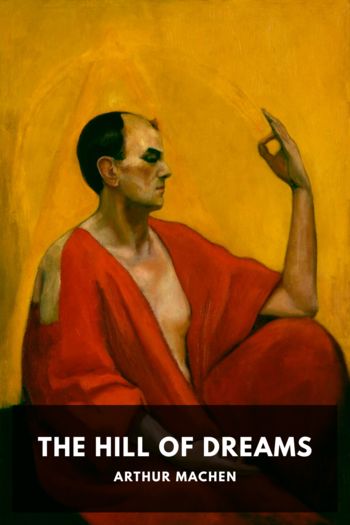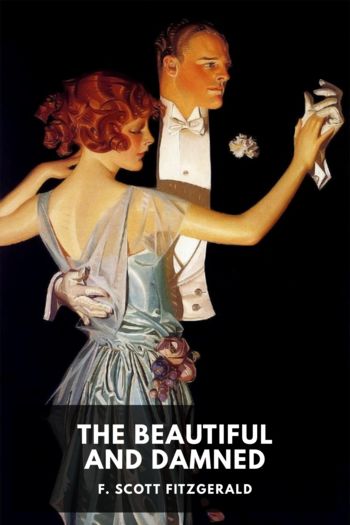The Hill of Dreams by Arthur Machen (best books for students to read .txt) 📕

- Author: Arthur Machen
Book online «The Hill of Dreams by Arthur Machen (best books for students to read .txt) 📕». Author Arthur Machen
When, of an evening, he was secure in his room, the blind drawn down and the gas flaring, he made vigorous efforts toward sanity. It was not of his free will that he allowed terror to overmaster him, and he desired nothing better than a placid and harmless life, full of work and clear thinking. He knew that he deluded himself with imagination, that he had been walking through London suburbs and not through Pandemonium, and that if he could but unlock his bureau all those ugly forms would be resolved into the mist. But it was hard to say if he consoled himself effectually with such reflections, for the return to common sense meant also the return to the sharp pangs of defeat. It recalled him to the bitter theme of his own inefficiency, to the thought that he only desired one thing of life, and that this was denied him. He was willing to endure the austerities of a monk in a severe cloister, to suffer cold, to be hungry, to be lonely and friendless, to forbear all the consolation of friendly speech, and to be glad of all these things, if only he might be allowed to illuminate the manuscript in quietness. It seemed a hideous insufferable cruelty, that he should so fervently desire that which he could never gain.
He was led back to the old conclusion; he had lost the sense of humanity, he was wretched because he was an alien and a stranger amongst citizens. It seemed probable that the enthusiasm of literature, as he understood it, the fervent desire for the fine art, had in it something of the inhuman, and dissevered the enthusiast from his fellow-creatures. It was possible that the barbarian suspected as much, that by some slow process of rumination he had arrived at his fixed and inveterate impression, by no means a clear reasoned conviction; the average Philistine, if pressed for the reasons of his dislike, would either become inarticulate, ejaculating “faugh” and “pah” like an old-fashioned Scots Magazine, or else he would give some imaginary and absurd reason, alleging that all “littery men” were poor, that composers never cut their hair, that painters were rarely public-school men, that sculptors couldn’t ride straight to hounds to save their lives, but clearly these imbecilities were mere afterthoughts; the average man hated the artist from a deep instinctive dread of all that was strange, uncanny, alien to his nature; he gibbered, uttered his harsh, semi-bestial “faugh,” and dismissed Keats to his gallipots from much the same motives as usually impelled the black savages to dismiss the white man on an even longer journey.
Lucian was not especially interested in this hatred of the barbarian for the maker, except from this point, that it confirmed him in his belief that the love of art dissociated the man from the race. One touch of art made the whole world alien, but surely miseries of the civilized man cast amongst savages were not so much caused by dread of their ferocity as by the terror of his own thoughts; he would perhaps in his last despair leave his retreat and go forth to perish at their hands, so that he might at least die in company, and hear the sound of speech before death. And Lucian felt most keenly that in his case there was a double curse; he was as isolated as Keats, and as inarticulate as his reviewers. The consolation of the work had failed him, and he was suspended in the void between two worlds.
It was no doubt the composite effect of his failures, his loneliness of soul, and solitude of life, that had made him invest those common streets with such grim and persistent terrors. He had perhaps yielded to a temptation without knowing that he had been tempted, and, in the manner of De Quincey, had chosen the subtle in exchange for the more tangible pains. Unconsciously, but still of free will, he had preferred the splendor and the gloom of a malignant vision before his corporal pains, before the hard reality of his own impotence. It was better to dwell in vague melancholy, to stray in the forsaken streets of a city doomed from ages, to wander amidst forlorn and desperate rocks than to awake to a gnawing and ignoble torment, to confess that a house of business would have been more suitable and more practical, that he had promised what he could never perform. Even as he struggled to beat back the phantasmagoria of the mist, and resolved that he would no longer make all the streets a stage of apparitions, he hardly realized what he had done, or that the ghosts he had called might depart and return again.
He continued his long walks, always with the object of producing a physical weariness and exhaustion that would enable him to sleep of nights. But even when he saw the foggy and deserted avenues in their proper shape, and allowed his eyes to catch the pale glimmer of the lamps, and the dancing flame of the firelight, he could not rid himself of the impression that he stood afar off, that between those hearths and himself there was a great gulf fixed. As he paced down the footpath he could often see plainly across the frozen shrubs into the homely and cheerful rooms. Sometimes, late in the evening, he caught a passing glimpse of





Comments (0)